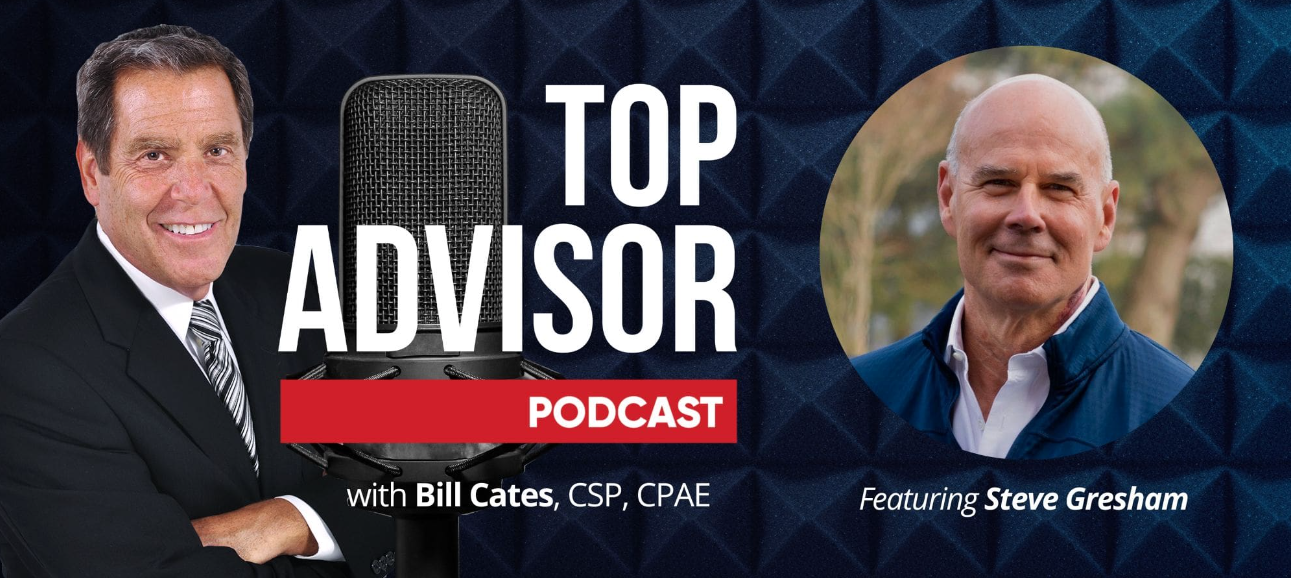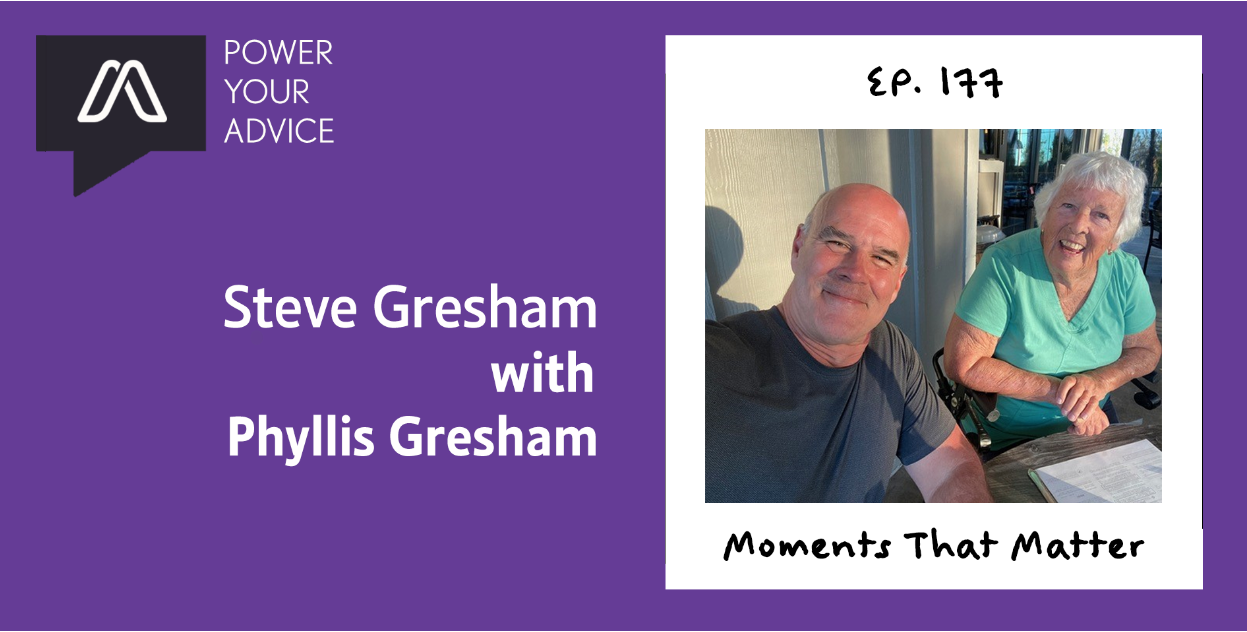Conversations About Longevity Planning and Preparing for the Unexpected with Steve Gresham
This may be one of the most important interviews we’ve done since the inception of Top Advisor Podcast.
The very best advisors know that their job is more than managing investments or selling insurance. The very best advisors are increasingly focused on Longevity Planning for the Baby Boomer clients.
These advisors prioritize building strong, meaningful connections with their clients, getting to know their individual life stories, and providing guidance through critical life-changing events.
In this episode, Referral Coach Bill Cates and Steve Gresham delve into the fascinating world of longevity planning and the importance of being prepared for unexpected events. As advisors, it’s crucial for us to anticipate these events and help our clients navigate through them with expertise and care.
You’ll hear real-life examples of advisors who have let their clients down in this area as well as examples of advisors who showed up big time for their clients.
But it doesn’t stop there. Bill and Steve explore the growing demographic wave of older individuals and the unique challenges they face. Longevity planning is not something to be taken lightly.
Steve Gresham & Bill Cates discuss:
- The concept of “family conversation” and why it is important for advisors to have the courage to engage with their clients.
- The 7 moments that matter in a client’s life AND the 7 phone calls every advisor should be prepared to receive.
- Why clients may hesitate to share personal health information with their advisors due to concerns about empathy and a safe space.
- The life events that may be a surprise to clients – but not to their advisors – who should be prepared and experienced in dealing with them.
- How financial advisors can ensure that they are addressing the concerns and needs of aging clients, even if the clients may feel hesitant to share personal health information.
- What longevity planning is, and key issues to consider when creating a longevity plan for clients.
- Stories of success and failure in longevity planning.
- … And so much more!
As always, this episode is packed with valuable information and practical strategies for financial advisors to better serve their clients. So, get ready to learn the secrets to success in the world of longevity planning as we dive into an engaging conversation with Steve Gresham.
https://media.blubrry.com/topadvisorpodcast/content.blubrry.com/topadvisorpodcast/TAP_Ep_48.mp3
Moments That Matter: The Default Caregiver With Steve and Phyllis Gresham
In this podcast, Steve Gresham, the Managing Principal of NextChapter and the Senior Education Advisor with the Alliance of Lifetime Income, is joined by his mother, Phyllis Gresham, for a special episode on the role as the default caregiver. Steve and Phyllis delve into the intricacies of caregiving, sharing personal anecdotes, financial challenges, and reflections on aging while highlighting the importance of planning for the future.
They also discussed:
- The advocacy and caregiver role in long-term care and the challenges that follow, especially for women.
- Dealing with care for elderly relatives with cognitive issues.
- The importance of planning and communication in caregiving and finances.
- The need for advisors to discuss potential constraints and scenarios with clients.
- The self-centered focus older individuals tend to have, not interested in others’ experiences.
- Addressing devastating diagnoses and the challenges of treatment decisions
- Phyllis’s reflections on her own aging process and how she chooses meaningful activities.
Resources: NextChapter | Alliance for Lifetime Income
https://media.blubrry.com/poweryouradvicepodcast/ins.blubrry.com/poweryouradvicepodcast/PYA_EP_177.mp3
The Moments That Matter: Seven Questions Will Make - Or Break - Your Advisory Practice
The text message said it all. “Sorry I went dark. My dad has stage three lung cancer and we’ve been scrambling to deal with that.”
I was wondering about a close friend and colleague. We had connected recently and made plans to work on a project together. The text message cleared up the mystery but also created new priorities for us both. Perhaps because I’m getting older, these messages are becoming more frequent – not just about relatives and friends but also age contemporaries like my friend Gavin Spitzner, just 57 when he died.
An Unexpected Health Event is one of The Seven Moments That Matter, the foundational work of our NextChapter project, The Family Conversation.
Working directly with financial advisors this summer, they confirmed the importance of both the topics and the need to prepare. “I’ve had them all”, declared one advisor in St. Petersburg, FL – a hotspot for aging and longevity planning. And while their level of proactivity with the topics varied, all of the advisors acknowledged the need to be available, show concern and have options.
Listening is the First Line of Engagement
Active listening is important. But proactively discussing the Moments with clients is more difficult, according to the advisors. “I’ve had clients tell me they don’t want to think about how they are at risk for a healthcare issue or having to leave their home”, observed another advisor, “They prefer to wait for the event”. Our part-time consultant to the project, my 89 year old mother, goes even further in her observations of age contemporaries. “Most people just don’t plan”, says the refugee from Hurricane Ian back in September 2022. One of our advisors based in suburban Philadelphia countered, “I disagree. I think most people do plan. They just don’t plan well!”.
Listening actively means allowing emotions to flow. All of the Moments are traumatic for the impacted person, as well as for family members. It is nearly impossible to be fully “prepared” for elder fraud, identity theft, a fall – even a divorce late in life. My mother had everything in pretty good shape and had experienced four of the seven moments herself when she lost her home in the hurricane, notching number five on our list. Listen to her talk about “aging in place”: Moments That Matter: Aging in Place with Steve and Phyllis Gresham
Most clients are still processing the Moment when they contact you. The very act of making contact requires courage – especially if the caller is not the primary client. The unengaged spouse or child that connects with you may not know you or know how you will react. A client of my firm years ago had never met her husband’s advisor and had never so much as written a check. Bill took care of all financial affairs and investments and taxes, while his wife, Jackie was the family CEO and chief medical officer. Bill’s diagnosis of multiple myeloma was a body blow to the family and to Jackie. She did not speak at the first meeting with the advisor, who really did not know Bill very well at all. But the advisor, Annemarie, made Jackie feel at ease, taking Jackie under her protective wing. Jackie would tell me months later when we met that Annemarie “saved her life”.
The Shelf Life of a Moment also Matters
A great colleague of mine once said of the Moments we researched together that each had a “shelf life” – much like a carton of milk. If the client came forward with their event, with the courage to engage, we as advisors have to respond appropriately but also timely. We cannot linger or delay – we only increase the concerns of the client. Our response will also be judged by by the client’s family, who may now be in control of the relationship. There are countless studies and statistics across the industry reporting that “70% of widows fire their husband’s advisor” or other indications that intergenerational transfer of wealth is more the exception than the rule. Our experience indicates that failure to respond quickly and with empathy to a Moment is the trigger leading to those departures.
Gender Matters
Because women typically outlive men, they are both the subject of more “Moments” as well as the responsible party for their resolution. In my mother’s life, she has been the caregiver/decisionmaker for two grandparents, her parents and my father, who died of pancreatic cancer. That role spans nearly my entire lifetime and 2/3 of hers. The disruption caused by longevity is one of the greatest but least appreciated costs to our economy. Most families will be engaged in care – and more in depth and for far longer than they expect. We hear from retirement plan sponsors about employees seeking benefits and time off for eldercare. One Fortune 100 firm reports that unexpected demands of eldercare have exceeded employee time off for maternity and paternity leave. And we know anecdotally that the majority of those caregivers are – and will continue to be – women.
The Health Curveball
Health is such a variable that in my own personal life I see an amazing array of care situations that were not foreseen by the people now consumed by the challenges. Unprecedented longevity is the culprit for most – including the role reversal of an 85 year old parents caring for a 57 year old son with terminal cancer. Or the 62 year old widow living with the 95 year old widower father. Or the 80 year old “traveling companions”, who lost their spouses and now one of them is suffering from severe dementia. What role does the “companion” have relative to the other’s family? My mother pipes in again with her observation that most everyone who’s aging has “body complaints” – nagging issues that are chronic but manageable. “And then there’s the BOOM”, she says, “That’s the one you probably didn’t see coming. But that one changes the game.” In her world most recently, a friend was out for a casual bike ride on her three wheeler and suffered a stroke – during the ride. No warning signs. “And down she went”, says Mom. “She will be OK at some level, but her Maine vacation home is no longer an option”.
Reality Bites
Depressing stuff? Sure, but that’s life, as they say. And all of the Moments That Matter are likely to impact every client family you have today, so your preparation will pay you back many times over. And you have a wide open field of play now because competition is generally unprepared. According to a recent survey of clients and advisors conducted by the Alliance for Lifetime Income, 73% of advisors say they discuss “retirement protection” with their clients – but only 33% of clients agree. That disconnect is a gift to the prepared advisor.
The Rest of the Moments
Keep this list handy and use it to ask clients about their level of preparation. Perhaps not all of them, but question what the plan should be if any of these items hit the family. My mother offers a tip, “Don’t tell the story of another person who had something happen to them. Most older people think mostly about themselves as they age – you can be direct and personal but make it about them”.
- An unexpected family health event – what would you do if your wife suffered a stroke?
- Having trouble making financial decisions – what should we do if your dad can’t manage his account?
- Recently widowed client with adult children – if something happened to Gary, would your kids be able to help you?
- “Gray divorce” creating financial insecurity – how are your assets titled today? Would your kids and his kids be treated fairly?
- Retirees worried about paying for healthcare – what Social Security and Medicare elections have you made? Do you have long-term care insurance? Do you know what a CCRC is?
- Older adults want to age in place – how have you secured your home in the event you cannot climb the stairs? Do you feel safe at night alone?
- Elder financial abuse, fraud and identity theft – how do you protect your account passwords? Do you pay bills online? Do you subscribe to any protection services?
Aging is the New Normal
All of the Moments are common – even daily occurrences among advisory firms. As the population continues to age (the oldest boomers are now 77), the media will be swamped with stories and examples of good planning – and train wrecks. Read mine here. And the media will be training our clients about the risks ahead. So it will be less and less difficult for you to start these Family Conversations with a provocative question about how prepare and protect your client. And their family will be appreciative.
Mom gets the parting shot, “Sometimes fate makes the tough decisions for you”. Onward!



